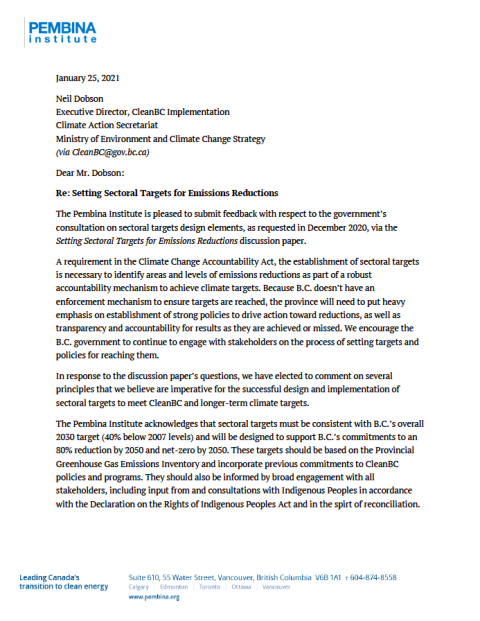The Pembina Institute is pleased to submit feedback with respect to the government’s consultation on sectoral targets design elements, as requested in December 2020, via the Setting Sectoral Targets for Emissions Reductions discussion paper.
A requirement in the Climate Change Accountability Act, the establishment of sectoral targets is necessary to identify areas and levels of emissions reductions as part of a robust accountability mechanism to achieve climate targets. Because B.C. doesn’t have an enforcement mechanism to ensure targets are reached, the province will need to put heavy emphasis on establishment of strong policies to drive action toward reductions, as well as transparency and accountability for results as they are achieved or missed.
We have elected to comment on several principles that we believe are imperative for the successful design and implementation of sectoral targets to meet CleanBC and longer-term climate targets.
Download the full submission, or read the summary below.
In summary
Design principles: We believe that the principles outlined by the government are of high importance. We suggest additional principles, such as long-term vision, consistency of the methodologies, and enforceability, which we believe merit inclusion.
Target metrics: We support percentage-based targets, as they have a better chance of reducing emissions across different sectors.
Sector grouping: We support disaggregation beyond three sectors. We believe the “Transportation,” “Industry,” and “Buildings and Communities” sectors should be further divided to ensure the transparency of emissions reporting and control.
Other design features: We believe that offsets and emissions credits should not be prioritized for meeting the GHG budget and should not be used to compensate for missed opportunities.
Stringency of sectoral targets: We believe that sectors with high and growing emissions should be subject to more stringent targets, even though there may be short-term affordability and ease of implementation concerns. We also believe that a less stringent target should not result in less effort and investment to reduce emissions from any sector. We also suggest that the gas sector be subjected to a stringent target as the emerging industries in this sector (e.g. LNG and blue hydrogen) have access to best-in-class technologies.








